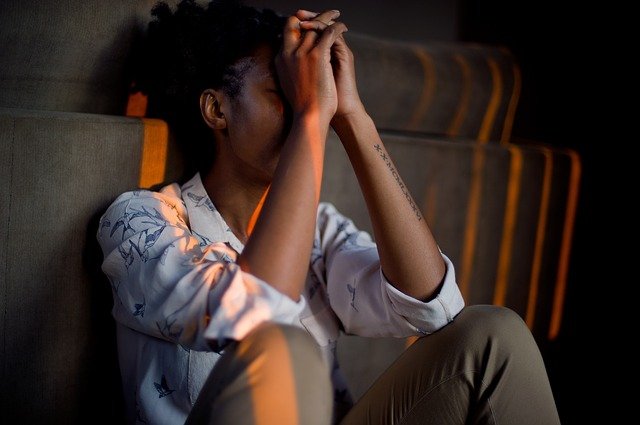Understanding the Link Between Anxiety and Depression
Anxiety and depression are two of the most common mental health disorders, affecting millions of people worldwide. While they are often treated as separate conditions, there is a strong link between the two. In fact, studies have shown that nearly half of those diagnosed with depression also have an anxiety disorder. In this article, we will explore the connection between anxiety and depression, and how understanding this link can help in the treatment of these disorders.
What is Anxiety?
Symptoms of Anxiety

by Joice Kelly (https://unsplash.com/@joicekelly)
Anxiety is a feeling of worry, fear, or unease that can be triggered by a specific event or situation. It is a normal response to stress and can even be beneficial in certain situations. However, when anxiety becomes excessive and interferes with daily life, it can be classified as an anxiety disorder.
Some common symptoms of anxiety include:
- Feeling nervous, restless, or tense
- Increased heart rate or palpitations
- Difficulty concentrating
- Muscle tension or aches
- Difficulty sleeping
- Irritability or anger
- Avoiding certain situations or activities
Types of Anxiety Disorders
There are several types of anxiety disorders, including:
- Generalized Anxiety Disorder (GAD): characterized by excessive worry and anxiety about everyday events and activities.
- Panic Disorder: marked by sudden and repeated episodes of intense fear and physical symptoms, such as chest pain and shortness of breath.
- Social Anxiety Disorder: a fear of social situations and interactions, often leading to avoidance of social events.
- Specific Phobias: an intense fear of a specific object or situation, such as heights or spiders.
What is Depression?
Symptoms of Depression

by Ehimetalor Akhere Unuabona (https://unsplash.com/@mettyunuabona)
Depression is a mood disorder that causes persistent feelings of sadness, hopelessness, and loss of interest in activities that were once enjoyable. It can also lead to physical symptoms, such as changes in appetite and sleep patterns. Its severity can be measured with the help of questionnaires like the beck depression inventory ii, which will then help professionals work out how best to approach treatment for individuals.
Some common symptoms of depression include:
- Persistent feelings of sadness, emptiness, or hopelessness
- Loss of interest in activities once enjoyed
- Changes in appetite or weight
- Difficulty sleeping or oversleeping
- Fatigue or loss of energy
- Feelings of worthlessness or guilt
- Difficulty concentrating or making decisions
- Thoughts of death or suicide
Types of Depression
There are several types of depression, including:
- Major Depressive Disorder (MDD): characterized by persistent feelings of sadness and loss of interest in activities.
- Persistent Depressive Disorder (PDD): a chronic form of depression that lasts for at least two years.
- Postpartum Depression: a type of depression that occurs after giving birth.
- Seasonal Affective Disorder (SAD): a type of depression that occurs during the winter months when there is less sunlight.
The Link Between Anxiety and Depression
While anxiety and depression are two distinct disorders, they often occur together. In fact, research has shown that nearly half of those diagnosed with depression also have an anxiety disorder. This is known as comorbidity, and it can make the treatment of these disorders more challenging.
Shared Risk Factors

by Yuris Alhumaydy (https://unsplash.com/@yrss)
Both anxiety and depression have similar risk factors, including:
- Genetics: having a family history of anxiety or depression can increase your risk of developing these disorders.
- Trauma or stressful life events: experiencing a traumatic event or ongoing stress can trigger the development of anxiety or depression.
- Brain chemistry: imbalances in certain brain chemicals, such as serotonin and dopamine, have been linked to both anxiety and depression.
- Chronic health conditions: certain chronic health conditions, such as heart disease and diabetes, can increase the risk of developing anxiety and depression.
Shared Symptoms
Anxiety and depression also share many of the same symptoms, such as difficulty sleeping, irritability, and difficulty concentrating. This can make it difficult for healthcare professionals to accurately diagnose and treat these disorders.
Anxiety as a Symptom of Depression
In some cases, anxiety can be a symptom of depression. This is known as “anxious depression” and is characterized by persistent feelings of sadness and hopelessness, along with symptoms of anxiety. It is important to address both the depression and anxiety in these cases, as treating only one may not fully alleviate the symptoms.
Treatment Options for Anxiety and Depression
Therapy

by Priscilla Du Preez 🇨🇦 (https://unsplash.com/@priscilladupreez)
Therapy, also known as talk therapy, is a common treatment for both anxiety and depression. It involves working with a trained therapist to identify and address the underlying causes of these disorders. Therapy can also help individuals develop coping mechanisms and learn how to manage their symptoms.
Medications
Medications, such as antidepressants and anti-anxiety medications, are often prescribed to treat anxiety and depression. These medications work by balancing brain chemicals and can help alleviate symptoms. However, they may not be effective for everyone and can have side effects.
Lifestyle Changes
Making lifestyle changes, such as exercising regularly, getting enough sleep, and practicing relaxation techniques, can also help manage symptoms of anxiety and depression. These changes can also improve overall mental and physical health.
The Role of Eliquis in Anxiety and Depression
Eliquis is a medication used to prevent blood clots and reduce the risk of stroke in individuals with certain heart conditions. While it is generally well-tolerated, some individuals may experience side effects, including anxiety and depression.
If you are taking Eliquis and experiencing symptoms of anxiety or depression, it is important to speak with your doctor. They may recommend adjusting your dosage or switching to a different medication.
Finding a Depression and Anxiety Therapist Near Me

by visuals (https://unsplash.com/@visuals)
If you are struggling with anxiety and depression, it is important to seek help from a trained professional. A therapist who specializes in treating these disorders can provide personalized treatment and support.
To find a therapist near you, you can search online for “depression and anxiety therapist near me” or use a therapist directory website, such as Psychology Today or GoodTherapy.
Takeaways
Anxiety and depression are two common mental health disorders that often occur together. They share similar risk factors and symptoms, making diagnosis and treatment challenging. However, with the right treatment, including therapy, medication, and lifestyle changes, individuals can manage their symptoms and improve their overall well-being. If you are experiencing symptoms of anxiety or depression, it is important to seek help from a trained professional.





